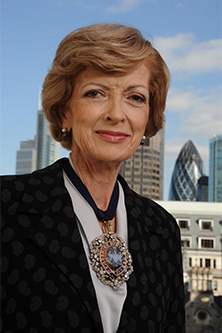
On November 27th, former Lord Mayor of London Fiona Woolf visited the Initiative on Cities to discuss her efforts on sustainability and innovation within London’s electricity industry.
Woolf began to speak on a Lord mayor’s numerous responsibilities, one being a “champion of the city brand” to creating opportunities within the city. Though, measuring cities can be a challenge, which creates discrepancies between data and real life planning. Furthermore, waiting for approvals for urban infrastructure “takes forever, especially if there are national agencies or a government that’s involved,” said Woolf.
Since municipalities operate closer to the communities they work in, they often do a better job at financing than national agencies. Woolf also acknowledged that London could learn from Boston’s habit of creating mutually beneficial private partnerships for new projects, saying “we have got an extraordinary amount of innovation that we’ve never seen before, which is focused on collaboration as opposed to competition.” In regards to patient capital, Woolf encouraged sustainability efforts and clarification of the specific spending points.
Woolf hypothesized that consumers don’t like the price of energy, but often won’t go out of their way to purchase new electricity efficient home technology, either. Thus, governments should use its policy interventions and market power to sway consumers towards efficiency. “A lot of what’s happening in the electricity sector involves standing on your head,” said Woolf. “Putting some well-established thoughts or assumptions behind you and thinking about doing things differently.”
Within the electricity industry, Woolf is “not looking in the rear-view mirror. [She’s] very much focused on what’s ahead.” She encouraged a demand-side response, distributed energy resources and interconnections in a more transparent system. The current regulators aren’t “valuing flexibility in an industry where demand and supply must match in real time,” said Woolf.
Regulators should insist on increasing their system’s energy efficiency and encourage innovation across the public and private sectors, emphasized Woolf. Bureaucracy may be a burden, but it’s also a pathway to financing and collaboration across sectors.
Watch the presentation